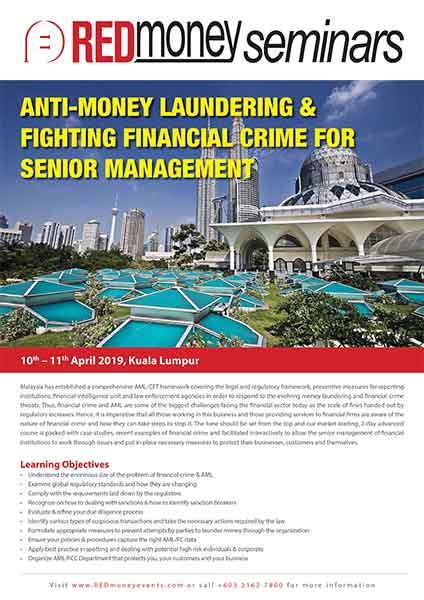About The Seminar
Malaysia has established a comprehensive AML/CFT framework covering the legal and regulatory framework, preventive measures for reporting institutions, financial intelligence unit and law enforcement agencies in order to respond to the evolving money laundering and financial crime threats. Thus, financial crime and AML are some of the biggest challenges facing the financial sector today as the scale of fines handed out by regulators increases. Hence, it is imperative that all those working in this business and those providing services to financial firms are aware of the nature of financial crime and how they can take steps to stop it. The tone should be set from the top and our market leading, 2-day advanced course is packed with case-studies, recent examples of financial crime and facilitated interactively to allow the senior management of financial institutions to work through issues and put in place necessary measures to protect their businesses, customers and themselves.
Learning Objectives
- Understand the enormous size of the problem of financial crime & AML
- Examine global regulatory standards and how they are changing
- Comply with the requirements laid down by the regulators
- Recognize on how to dealing with sanctions & how to identify sanction breakers
- Evaluate & refine your due diligence process
- Identify various types of suspicious transactions and take the necessary actions required by the law
- Formulate appropriate measures to prevent attempts by parties to launder money through the organization
- Ensure your policies & procedures capture the right AML/FC data
- Apply best practice in spotting and dealing with potential high risk individuals & corporate
- Organize AML/FCC Department that protects you, your customers and your business
Date: 10th & 11th April 2019
Venue: Kuala Lumpur
This course is of most benefit to:
- C-Suite Executives
- Board of Directors
- Heads of Compliance
- Heads of Risk Management
- Heads of Internal Audit
- Heads of Operations
- Heads of Sales
- Heads of Legal
- Regulators
Early bird : RM3,599
Standard : RM3,999 per delegate
2 delegates (5% Discount) : RM3,799 per delegate
3 delegates (15% Discount) : RM3,399 per delegate
4 delegates (25% Discount) : RM3,199 per delegate
5 delegates (30% Discount) : RM2,799 per delegate
If you are looking for an in-house training program or wish to send a group to an existing public program, kindly please contact Andrew Tebbutt at [email protected] or +603 2162 7802.
Learn More
Kindly complete the registration form and email to [email protected] or fax +603 2162 7810
For enquiries please contact:
Normariya Sariman
Account Manager, REDmoney Seminars
[email protected]
Direct Line: +603 2162 7800 ext 44
Ramesh Kalimuthu
Events Sales Director
[email protected]
Direct Line: +603 2162 7800 ext 65
Fax: +603 2162 7810
For sponsorship & speaking opportunities:
Andrew Tebbutt
Managing Director
[email protected]
Direct Line: +603 2162 7802
For marketing and media enquiries
Govina Selvanthran
Marketing Manager
[email protected]
Direct Line: +603 2162 7800 ext 22
Seminar Agenda
- What do we mean by financial crime & modern advanced typologies
- Global size of the problem and geographical ‘hot-spots’
- The basic structure of money laundering transactions
- Tax avoidance/evasion – differences and impact on financial institutions
- The role of the Board & senior management in fighting financial crime
By the end of this session, delegates will be able to identify the different types of financial crime and explain the different stages of laundering money through the financial system
- Trade, trade finance and flaws in banking/regulatory structures
- Payments, payment systems and their vulnerability
- Commercial banking money laundering examples
- How the retail banking system is used to launder money
- Investment banking indicators and examples
- The real estate sector and its vulnerability
- How money is laundered through the luxury sector [inc. casinos]
By the end of this session, delegates will be able to identify money laundering schemes that have occurred in the different sectors of financial services and analyse/critique efforts to stop money laundering
- The role of multi-jurisdictional regulators in combating financial crime
- Understanding the consequences of non-compliance for financial institutions
- Examining new & forthcoming regulations [e.g 5MLD/FinCen]
- FCPA and trans-national issues
- Changes to local regulations and their impact
- How to deal with political and regulatory risk
By the end of this session, delegates will be able to name the global regulatory bodies and their functions as well as define the impact of the tightening of global regulations.
- The rise of the use of technology in criminal transactions
- Cryptocurrencies and their impact
- Examining the difficulties in regulating technological crime
- Instances of financial institutions under attack
By the end of this session, delegates will be able to identify the technological advances that pose a threat to a financial institution and how they might control how criminals use technology
- Defining sanctions
- Who and what are sanctioned?
- OFAC and other sanction bodies
- The changing environment – recent changes by the US
- Examples of sanctions breaches and penalties
By the end of this session, delegates will be able to identify the different types of financial sanctions and explain how the different sanction bodies work as well as defining the impact of recent changes in the US sanctions regime
- Structures used to hide criminal gains
- Trusts, bearer share corporations and offshore companies
- Other LLCs, Foundations and charities
- Jurisdictions with weak governance used to conceal ownership & beneficiaries
- Techniques used to establish identities of key parties
- Why are regulators concentrating on KYC?
By the end of this session, delegates will be able to identify the key structures used to hide stolen assets and also the different parts of the world that are used to conceal ownership of these assets. We will also examine the regulatory imperative to establish who banks are really dealing with and the impact of the Panama & Paradise Papers
- Compliance is everyone’s business
- Three lines of defence?
- What do regulators look for in AML structures?
- Creating a world-class compliance culture
- AML policies & procedures that really work – protecting you, your customers and your business
- Case studies of compliance successes and failures
By the end of this session, delegates will be able to identify the key strengths and weaknesses in compliance structures and how regulators view best practice in this area.
- During this session, delegates will use the knowledge and skills acquired throughout the day to create a template of ‘best practice’ for identifying financial crime and dealing with issues arising from AML issues in their day-to-day job. To do this, they will work in groups but prepare their own action plan to take away.
- This session re-enforces the key points taught throughout the day and ensures that new skills are embedded for the future.
Course review & summary
Date: 10th & 11th April 2019
Venue: Kuala Lumpur
This course is of most benefit to:
- C-Suite Executives
- Board of Directors
- Heads of Compliance
- Heads of Risk Management
- Heads of Internal Audit
- Heads of Operations
- Heads of Sales
- Heads of Legal
- Regulators
Early bird : RM3,599
Standard : RM3,999 per delegate
2 delegates (5% Discount) : RM3,799 per delegate
3 delegates (15% Discount) : RM3,399 per delegate
4 delegates (25% Discount) : RM3,199 per delegate
5 delegates (30% Discount) : RM2,799 per delegate
If you are looking for an in-house training program or wish to send a group to an existing public program, kindly please contact Andrew Tebbutt at [email protected] or +603 2162 7802./p>
Kindly complete the registration form and email to [email protected] or fax +603 2162 7810
About The Seminar
Malaysia has established a comprehensive AML/CFT framework covering the legal and regulatory framework, preventive measures for reporting institutions, financial intelligence unit and law enforcement agencies in order to respond to the evolving money laundering and financial crime threats. Thus, financial crime and AML are some of the biggest challenges facing the financial sector today as the scale of fines handed out by regulators increases. Hence, it is imperative that all those working in this business and those providing services to financial firms are aware of the nature of financial crime and how they can take steps to stop it. The tone should be set from the top and our market leading, 2-day advanced course is packed with case-studies, recent examples of financial crime and facilitated interactively to allow the senior management of financial institutions to work through issues and put in place necessary measures to protect their businesses, customers and themselves.
Learning Objectives
- Understand the enormous size of the problem of financial crime & AML
- Examine global regulatory standards and how they are changing
- Comply with the requirements laid down by the regulators
- Recognize on how to dealing with sanctions & how to identify sanction breakers
- Evaluate & refine your due diligence process
- Identify various types of suspicious transactions and take the necessary actions required by the law
- Formulate appropriate measures to prevent attempts by parties to launder money through the organization
- Ensure your policies & procedures capture the right AML/FC data
- Apply best practice in spotting and dealing with potential high risk individuals & corporate
- Organize AML/FCC Department that protects you, your customers and your business
Seminar Agenda
- What do we mean by financial crime & modern advanced typologies
- Global size of the problem and geographical ‘hot-spots’
- The basic structure of money laundering transactions
- Tax avoidance/evasion – differences and impact on financial institutions
- The role of the Board & senior management in fighting financial crime
By the end of this session, delegates will be able to identify the different types of financial crime and explain the different stages of laundering money through the financial system
- Trade, trade finance and flaws in banking/regulatory structures
- Payments, payment systems and their vulnerability
- Commercial banking money laundering examples
- How the retail banking system is used to launder money
- Investment banking indicators and examples
- The real estate sector and its vulnerability
- How money is laundered through the luxury sector [inc. casinos]
By the end of this session, delegates will be able to identify money laundering schemes that have occurred in the different sectors of financial services and analyse/critique efforts to stop money laundering
- The role of multi-jurisdictional regulators in combating financial crime
- Understanding the consequences of non-compliance for financial institutions
- Examining new & forthcoming regulations [e.g 5MLD/FinCen]
- FCPA and trans-national issues
- Changes to local regulations and their impact
- How to deal with political and regulatory risk
By the end of this session, delegates will be able to name the global regulatory bodies and their functions as well as define the impact of the tightening of global regulations.
- The rise of the use of technology in criminal transactions
- Cryptocurrencies and their impact
- Examining the difficulties in regulating technological crime
- Instances of financial institutions under attack
By the end of this session, delegates will be able to identify the technological advances that pose a threat to a financial institution and how they might control how criminals use technology
- Defining sanctions
- Who and what are sanctioned?
- OFAC and other sanction bodies
- The changing environment – recent changes by the US
- Examples of sanctions breaches and penalties
By the end of this session, delegates will be able to identify the different types of financial sanctions and explain how the different sanction bodies work as well as defining the impact of recent changes in the US sanctions regime
- Structures used to hide criminal gains
- Trusts, bearer share corporations and offshore companies
- Other LLCs, Foundations and charities
- Jurisdictions with weak governance used to conceal ownership & beneficiaries
- Techniques used to establish identities of key parties
- Why are regulators concentrating on KYC?
By the end of this session, delegates will be able to identify the key structures used to hide stolen assets and also the different parts of the world that are used to conceal ownership of these assets. We will also examine the regulatory imperative to establish who banks are really dealing with and the impact of the Panama & Paradise Papers
- Compliance is everyone’s business
- Three lines of defence?
- What do regulators look for in AML structures?
- Creating a world-class compliance culture
- AML policies & procedures that really work – protecting you, your customers and your business
- Case studies of compliance successes and failures
By the end of this session, delegates will be able to identify the key strengths and weaknesses in compliance structures and how regulators view best practice in this area.
- During this session, delegates will use the knowledge and skills acquired throughout the day to create a template of ‘best practice’ for identifying financial crime and dealing with issues arising from AML issues in their day-to-day job. To do this, they will work in groups but prepare their own action plan to take away.
- This session re-enforces the key points taught throughout the day and ensures that new skills are embedded for the future.
Course review & summary
Seminar Speaker

MA [Cantab], AMICA, CMEA; CEO
Cambridge Centre of Performance & Excellence
Mark is an experienced trainer and consultant with global knowledge, having lived & worked in the UK, Russia, Qatar and India and trained in almost every country. Having started his career as a stockbroker in London, he worked for US, Dutch and UK banks as a Director in the Sales & Sales Trading departments. He then became a partner in a small investment bank where he was Head of Trading and oversaw the Compliance function. Mark has been Global Head of L&D at a Russian investment bank and at a major Middle Eastern Sovereign Wealth Fund as well as a World Cup Organising Committee. He also managed the training section of a major offshoring project to India, training over 1500 staff in settlement, custody and compliance. In recent years, Mark has been one of the highest rated trainers in Anti-Money Laundering & Financial Crime Compliance, training in over 60 different countries in the last 3 years, including a global AML project for one of the world’s largest banks. He has trained staff in every area of banking and finance including [but not limited to] retail & corporate banking, investment banking, SME banking, private banking, asset management, hedge funds, SWFs and associated service providers. Comfortable at all levels, he has worked with main Board members to new graduate hires and induction programmes.
Clients Mark has worked for and allowed to tell other clients about include:
Qatar Investment Authority | Q2022 Supreme Committee | HSBC | XAC Bank | Credit Suisse | Barclays | Bank of China | Ashurst | Stapleford Asset Management | ABN Amro | Clearstream | Irish Times Training | Watson Farley & Williams | Carousel | BNP Paribas | Bank Inter | Renaissance Capital | RIM
For enquiries please contact:
Normariya Sariman
Account Manager, REDmoney Seminars
[email protected]
Direct Line: +603 2162 7800 ext 44
Ramesh Kalimuthu
Events Sales Director
[email protected]
Direct Line: +603 2162 7800 ext 65
Fax: +603 2162 7810
For sponsorship & speaking opportunities:
Andrew Tebbutt
Managing Director
[email protected]
Direct Line: +603 2162 7802
For marketing and media enquiries
Govina Selvanthran
Marketing Manager
[email protected]
Direct Line: +603 2162 7800 ext 22

 Anti-Money Laundering & Fighting Financial Crime for Senior Management
Anti-Money Laundering & Fighting Financial Crime for Senior Management
